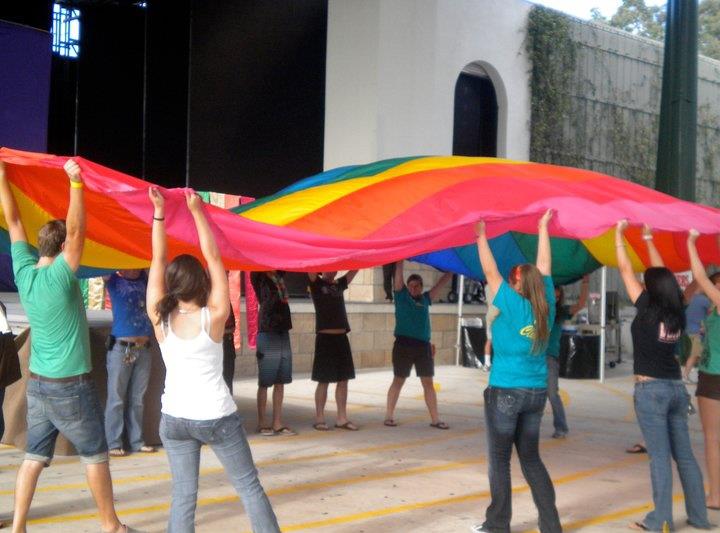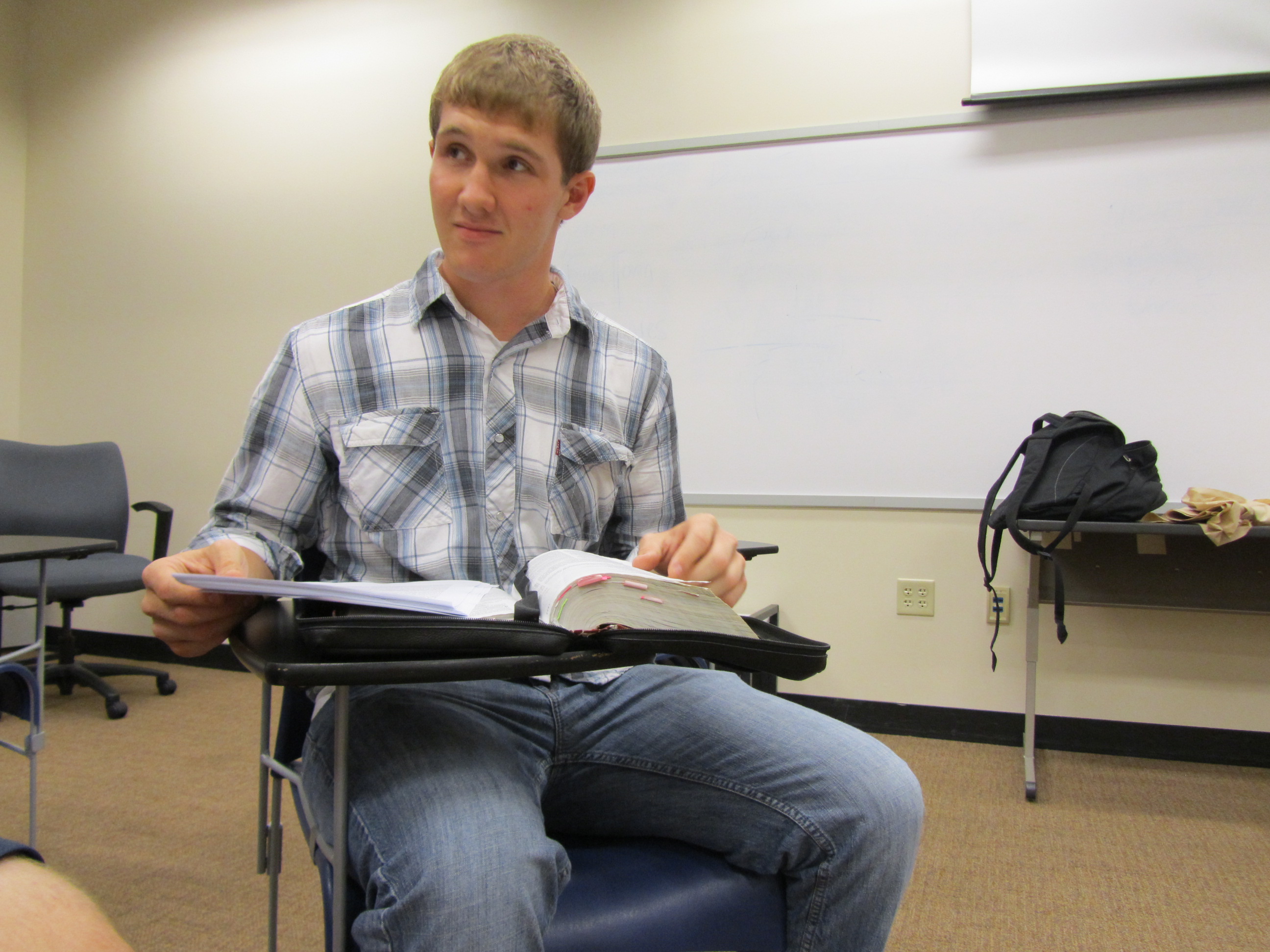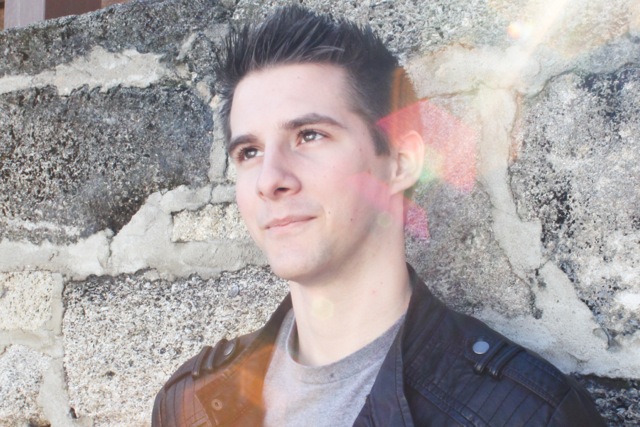By Alexa Epitropoulos | gargoyle@flagler.edu
The last thing Michael Shannon expected while attending a family wedding was to be discriminated against because of the person he loved.
Shannon was staying at a Clearwater hotel with his mother when he realized that several LGBTQ social networking sites and dating sites were blocked from the server. More than that, Shannon’s complaints were received with the manager’s assertion that it was a “family hotel.”
Shannon and his mother were also asked to vacate the premises with an escort, the manager’s 16-year-old son, in tow.
“I was shocked because it reminded me that this happens every day,” Shannon said. “This kind of stuff happens all the time and no one ever talks about it.”
Shannon, a 35-year-old Florida native, has experienced similar instances through personal situations and through activism within the LGBTQ community. Still, experience does not remove the sting of discrimination.
“Homophobia is unacceptable everywhere,” Shannon said, echoing a sentiment he had said to the manager while exiting the hotel.
Shannon is not alone in his struggle. Many gay, transgender and queer individuals face discrimination in many different ways, including in social situations and at the workplace. Though times are changing, discrimination still remains a major issue.
In the midst of a nationwide debate about marriage equality and a barrage of politicians officially endorsing gay marriage, including Florida Sen. Bill Nelson, the issue of discrimination has been left untouched.
Support for gay marriage may be at an all time high, with some Quinnipiac polls signifying that 50 percent of Americans support gay marriage, but discrimination against the LGBTQ community remains widespread and frequent.
Discrimination applies not only to gay or bisexual men and women, but to individuals who identify as transgender or gender queer.
From Hotel Lobby to Campus Grounds
For students, the impacts of discrimination are real and tangible. Members of the LGBTQ community are more likely to be harassed and assaulted than their straight peers. They are also more likely to face homelessness and negative psychological consequences, including substance abuse and depression. According to PFLAG, gay teens are 8.4 times more likely to attempt suicide.
Kayleigh Gades, the president of Club Unity at Flagler College, said that discrimination, especially against transgender and gender queer students, is still frequent.
“Discrimination is a problem and it is something that we deal with,” Gades said. “It is getting better, but we’re not there yet.”
Club Unity, a gay-straight alliance at the college, emphasized providing solace for LGBTQ students who may feel like they have no one to confide in and nowhere to turn. Gades says that education is another priority of the group.
“Our purpose is to educate people about the [LGBTQ] community and the people in it,” Gades said. “We want to say we’re here and we’re the same as everyone else.”
Gades said the effects of discrimination can be partially combatted by providing a safe place for gay, bisexual, transgender and queer students. Club Unity, according to Gades, provides one opportunity for students who need a helping hand.
Providing awareness for other LGBTQ issues, including transgender issues, is also one of the goals of Club Unity. Transgender and queer individuals often face discrimination because of their diverse gender identities. Something as simple as a trip to the bathroom or pronoun usage can be an issue.
“Club Unity is a safe place to go. You’re not discriminated against and there’s not going to be someone there judging you about something as superfluous as who you love or how you express yourself,” Gades said. “It’s a place to go where there’s someone who’s been through the same thing you’ve been through and has dealt with the same things you’ve dealt with.”
Gades said that raising awareness for these groups is key. Raising awareness is, however, a struggle for groups like Club Unity, who have faced problems with the Flagler College administration itself.
In 2007, Student Services denied a proposal to form Club Unity after Flagler’s Student Government Association initially approved it. Student Services turned down a similar group, the Gay-Straight Alliance, in 2004.
The group was deemed by Student Services to be outside of the realm of the college’s mission.
Although Flagler’s President William Abare, Jr., later overturned Club Unity’s denial, the club’s relatively recent institution represents the struggle that Club Unity and, thus, Flagler College’s LGBTQ population has faced.
Club Unity’s struggles have only solidified its goals. There are usually 20 or more people who attend the club’s weekly meetings. The club hopes to expand its membership and further emphasize education in the future.
That includes reaching out to “straight allies”, who are essential to providing fellowship within the group. Gades said that the group is looking into planning a straight ally appreciation day in the future.
“We’re all humans, we’re all people, we all should be treated equally and I think one of the biggest things is educating people,” Gades said.
Educating individuals and creating community between straight and LGBTQ communities, through groups like Club Unity and other gay-straight alliances, make a difference in the mental health of students, according to a 2011 Family Acceptance Project study.
The Family Acceptance Project concluded that students who had access to a gay-straight alliance were not only less likely to suffer from depression and substance abuse, but were more likely to succeed in higher education.
The number of licensed GSAs throughout the U.S. is over 4,000, according to the Gay, Lesbian & Transgender Education Network. The number of GSAs in Florida high schools and colleges is over 150, according to the GSA Network.
GSAs, however, are not the only way to address discrimination. Some students are finding new ways to fight back, even if it means finding solace through individualism.
Facing it Alone, Finding Solace Within
Kevin Ip, an openly gay Flagler College student, has faced more discrimination since he has been on campus. Ip, who calls South Florida home, said there is a noticeable difference between attitudes in North Florida and South Florida.
Ip says it is more common for people to place members of the LGBTQ in the same category, without considering differences between individuals.
“What I see a lot is people tend to push everyone in the same boat,” Ip said. “You could be minding your own businesses and someone could walk by and think ‘Oh my God, he’s hitting on me.'”
In Ip’s personal experience, most of the discrimination students at Flagler College face has to do with the practice of pushing all gay, transgender and queer individuals into the same category.
On one instance, Ip and a friend were walking past a male group on campus and heard them complain about how so many of the students at Flagler College are gay.
“I just feel like those that aren’t exposed to it are more close-minded and ignorant,” Ip added.
Ip has found solace from these instances of discrimination through embracing his own self-identity and ignoring the categories others impose on him.
“Personally, I don’t care. I like to be alone and I’m not going to look for people to follow around because that’s creepy and against the law,” Ip said.
Ip, who has acted as a student ambassador, often recommends Club Unity to prospective students or parents of prospective students who are searching for an accepting on-campus group. Ip, however, does not choose to be a part of it, mostly due to personal preferences. He said that, for him, acceptance is something found within.
“I like to be alone. I don’t like to draw attention to my personal life,” he said. “If you’re comfortable with that, that’s good. That’s you getting past the adversity.”
Acceptance Without Consequences
While Ip is able to find comfort outside of LGBTQ groups, many more gay, bisexual, transgender and queer individuals feel trapped in a cycle of discrimination that applies to many aspects of their lives, including to their careers and personal lives.
In 29 states, there are no anti-discriminatory laws prohibiting firing someone for being gay, transgender or queer. Florida is one of the states that offer no statewide protection to LGBTQ individuals. Instituting an anti-discriminatory law is only just beginning to be discussed in the state legislature.
Adding to existing problems is the fact that discrimination can happen in unconventional ways.
Online discrimination, like the discrimination faced by Shannon, is becoming more frequent, especially when it comes to access to certain websites being blocked and LGBTQ individuals being denied membership to online communities, such as dating websites.
In January 2013, a similar incident to Shannon’s was reported at one of the top U.S. government institutions: the Pentagon.
It was reported that LGBTQ advocate sites and blogs like the Human Rights Campaign, Towleroad and America Blog were banned by the Pentagon’s server, while sites like the National Organization for Marriage and the Family Research Council were not.
It is the discrimination while doing seemingly mundane things, like logging onto the internet, that can sting the most for Shannon. It goes to show that discrimination is widespread.
More than that, discrimination is something many members of the LGBTQ community deal with on a day-to-day basis.
Shannon, who now lives in Portland, faces these instances less often, but discrimination has never stopped altogether. If it’s not discrimination in his life, it’s hearing about and witnessing discrimination in the lives of others.
“There are some attitudes that are different, but we still face the same struggles,” Shannon said.







Be the first to comment on "LGBTQ discrimination remains major issue in 2013"